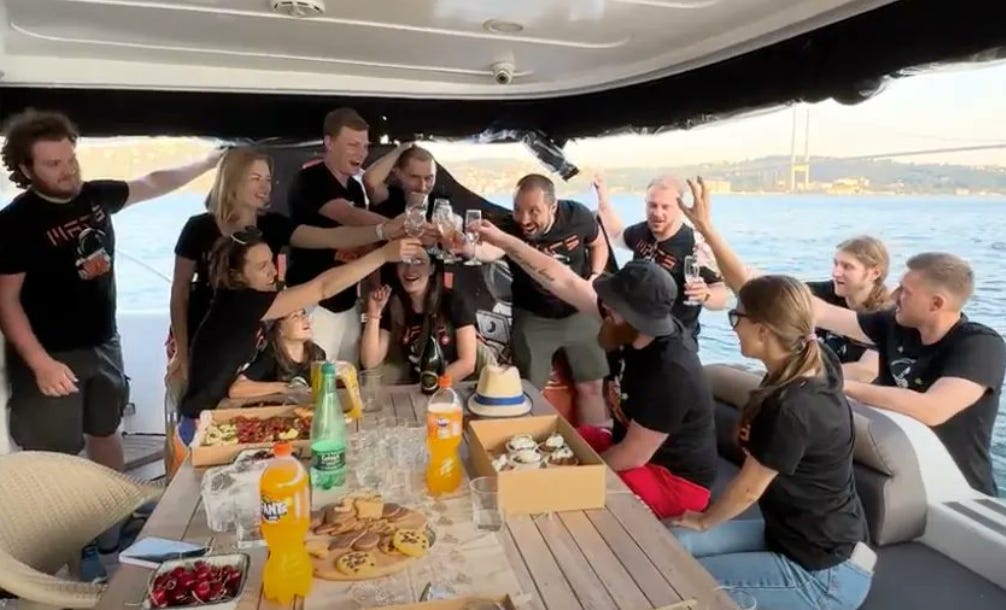Indie Hacker Making $2M/ARR with AI - John Rush
How to build portfolio of 16 startups
👋 Hey, I’m Daniil and welcome to a ✨ Maker Edition ✨ of Creators’ AI. By subscribing, you directly support Creators' AI mission to deliver top AI insights & practical knowledge without ads or clutter. Your subscription allows us to grow our dedicated team and curate the most important AI Tools, Stories, and Tutorials in one place. - Daniil
You know how optimistic we are when talking about AI opportunities, but today's guest is no less than proof that the NEW ERA has just started.
The new era of software and tech. And you will learn “WHY” from someone who is building 16 startups with the help of AI. He is not doing it with VC money or a large team. Instead, bootstrapping with most of it is - just 1 person/team (without counting AI Assistants, of course). He gave us an interview for AI Maker Edition and answered our questions.
Creators’ AI Subscription is the best gift for Creators and Entrepreneurs diving into AI.
I have been following him for few months and was really excited to see huge portfolio of indie startups runned by one person. I believe that we can learn from John many things.
Meet John Rush
How did you become an Indie Hacker?
I’ve been doing VC-funded startups for almost 10 years, raised large funding rounds, been to top accelerators, had a pretty good track record, and was on my way to building unicorns.
In 2018, I realized one thing: my network and I were obsessed with fundraising metrics over user traction metrics. That’s when I realized that the whole VC-funded startup ecosystem is obsessed with that, too. But there is another world: bootstrapped makers, which I accidentally discovered while browsing the internet and fell in love with.
It took me another few years to transition. I completely turned into seeking profitability and sustainable growth for my startups in the year 2021.
Only self-funded and bootstrapped since then. I still get some angel investors from my network to put money into my projects. But I don’t seek this actively, so I don’t consider this as VC-backed.
What does your current portfolio look like?
As I understand its a main startup of John. And the idea is amazing + it unites all other startups under one roof
→Unicornplatform.com website builder.
I can’t skip that I was using unicornplatform for last 2 years for different projects - really good website builder for indie SaaS startups. Unicornplatform has 100k sites running with 60k users registered
→Devhunt.org Open Source PH alternative for dev tools
→SeoBotAI.com SEO on 100% autopilot. zero actions needed
→Listingbott.com lists a tool on up to 1000 directories with 1 click for traffic/backlinks
→AllGPTs.co is the most popular custom GPT directory in the world
Algpts.co had almost half a million visits in November and 7 million clicks on gpt links
Can’t go through and say that this is literally one of few websites to discover Custom GPTs. Idk why OpenAI didn’t make it themselves
→filmgrail.com cinema SaaS platform. Powers cinemas on all continents, processing over $50M in ticket sales a year
→lorem.space image placeholder api
→marketsy.ai e-commerce and marketplaces powered by AI
→uigenerator.org generates UI mockups for your website
→cofondr.com cofounder as a service for busy solo makers
→indexgoogle.com index your new pages really fast, in just hours
→saasemailer.com dead simple emailers/CRM for solo makers
→nextjsstarter.com directory of all NextJS starters and boilerplates
→startupstools.com startup tools used by famous makers
→osssoftware.org vetted OSS alternatives for the tool you pay for
By their nature, 30% of these startups are AI startups.
Notable startups:
Devhunt. This is ProductHunt (we mentioned it last week here) for developers featuring open-source software and tools for developers every week.
John built in OG #buildinpublic way:
Devhunt was launched and is growing with a 674% growth rate MoM
MarsX got 40k people signing up for the waitlist, we still onboard just a few people and are going to onboard more in 2024
MarsX is a Developer IDE with pre-made templates, micro apps, and AI, ofc. What is also interesting is that MarsX has some startups inside. MarsX acquires SaaS companies to boost its ecosystem.
They pay in Cash & MarsX shares so you literally become part of their community and can capitalize your participation. So it’s cross investing in each other.
I think that this is cool concept for all types of makers to make alliances and build together & investing in each other.
Do you have a maker or software developer friends - share this concept with them!
Who is the target audience of your products?
Indie makers, solo founders, small startup teams
What do you think about the future of AI development?
We will see just 2 types of software: hyper-niched and mega-apps. One is doing just one thing well, and the other is doing everything pretty well. AI makes both possible and profitable. The middle will be gone.
Solo makers will dominate the software world, 50% of all great software will be run by 1-3 person teams. In the future, tech companies are run by 3-person teams:
1) CEO - for creative work: ideation, design, storytelling, branding, UX/UI, content creation, innovation, problem-solving, marketing strategy, and product vision.
2) CTO - handles all tech work using AI-powered development platforms like MarsX.
3) COO - all non-creative tasks: data entry, scheduling, bookkeeping, customer support, inventory management, quality assurance, compliance, reporting, recruitment, and payroll.
That's it. No managers, no more employees. The operations would scale by using AI agents and tools instead of people. So AI won’t replace the CEO/CTO/COO, but it will replace everyone below in a typical tech startup or company.
Interesting perspective, I am feeling that we can even outsource COO or switch it with Prompt Engineer who is managing everything with AI.
⚡️ Bonus Material from John (I took it from his Tweet). It feels like a tutorial or playbook
Today, I've decided to share what worked for me as a startup founder over all these years. My 13-step journey from an idea to revenue. I've used this method for every startup I've launched. Some were hits, others failures.
First step. I only build products that I would use myself. Every time I strayed from this rule, it didn't end well.
Next, I spend hours on Google search console, digging into keyword traffic trends.
Once a promising topic or keyword catches my eye, I form a niche idea around it.
Then comes the sharing part - tweeting, blogging, or even discussing it with my wife (her boredom is usually a good indicator of whether to proceed).
If there's traction around the content and idea, then quickly set up a landing page with a waitlist using unicornplatform
I search for online conversations where people express pain points that can be solved by my tool and direct them toward my waitlist.
I list the project on at least 100 directories via listingbott for immediate traffic boost and turn on http://seobotai.com for blog optimization before taking a step back from the project for about one month. After this break:
I check analytics:
Waitlist signups
Total & organic traffic
Social media engagement My criteria before coding begins is simple:
At least 100 people on the waitlist
Monthly visitor count of 1000+
Minimum of 300 organic visitors
Then comes creating an MVP as fast as possible, either by self-coding or hiring help/partnering up with another maker who codes while I promote it.
While building MVP, I connect with those who signed up, share details, and get feedback even before they try out the product.
Next, I invite interested wait-listers early into beta testing and gather their feedback over weeks/months to improve product features/fix bugs, etc.
Finally, I launch on Product Hunt (and DevHunt for dev tools) only after having users/fans onboarded personally one-by-one post-beta testing phase (this gives me invaluable insights). This brings 10x more traffic, and the real hustle starts here. Cold users are much more brutal with their feedback and judgment; some haters appear, too. I cry for a bit and get back to real-time prod fixes for a week. Eventually, things get to normal. And the project turns into a stable project with predictable growth. And I can move to my next experiment.
Some people say there will be no Devs in the future; what do you think about that?
I'm sure we won’t need junior or middle devs in the future. But we will need a lot more senior devs. So senior developers will be paid millions a month like movie/sports stars. The rest will have to pivot into other engineering, for example, hardware. I’d still learn programming, but I’d not expect to get a job as a web developer in 3-5 years if I was 15yo now.
What is the future of AI tools for devs & entrepreneurs?
Most AI tools use the “Copilot” idea, which will fail and be dominated by an “autopilot agent with an ability to take human input and own desire to ask questions if needed.” I’m building these tools, and they have insane traction. For example, seobot.
If you could start building a product from scratch - what direction or vertical would you choose?
I build one product from scratch every week. Following me on X will answer the question. Because it’s changing rapidly. I built and launched 6 directories in Nov, and 3 blew up with almost a million visitors. Today Im building micro saas tools with one button. Tomorrow, I will build more AI agents. All of this is connected into my grand plan. Reading all my tweets since September may answer this question pretty well.
What tools/products/hacks can you recommend to our audience?
Ironically, I mostly use my tools. I build my sites on unicornplatform. I build my SaaS tools on Marsx. I run my SEO with Seobot. I get backlinks by listing both. I even have my own AI chatbot instead of ChatGPT.
Well, well we also know how to make own AI chatbot, right?
Perhaps the only external list of tools is Google Sheets, notion, Twitter, Chrome, and Gmail.
Who do you read on X(Twitter)?
@DmytroKrasun @lennysan @lexfridman @marc_louvion @gregisenberg Inside My Head
Help your friends explore AI opportunities by sharing Creators’ AI!
That was John Rush, AI maker and guest of Creators’ AI. Follow him on X to see MarsX's journey or use some of his products. I am bullish on this guy and his team, as bootstrapping is the best strategy for any product about value and traction.
💡Did you like this guest? Feel free to share your thoughts with us!










